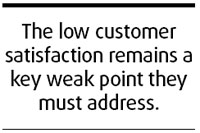Domestic banks must gain customer loyalty
Updated: 2008-03-03 13:57
China's largest commercial lender has admitted it is "weaker". But unfortunately, this sort of self-examination is neither made because of rising financial risks the US subprime crisis is causing nor concerned with the bank's profit prospects under a tightening monetary policy.
Yang Kaisheng, president of the Industrial and Commercial Bank of China, made such a surprising statement last week in view of the industry's poor public image. It was reported by Beijing News that Yang urged the banking association to clarify that Chinese banks are not monopolistic institutions as the public perceives.

By claiming domestic commercial lenders are the disadvantaged too, the banker seemingly tended to correct a misunderstanding some people have about the industry.
A recent case has raised simmering public complaints. A man who used an ATM's technical defect to withdraw hundreds of thousands of yuan in 2006 was sentenced to life, even though a local higher court later threw out the case and ordered a retrial.
People are angry about the case not only because of the inequity between banks and individual customers. In this case, the bank was exempted from any legal obligation for the consequences of its faulted ATM. The masses also feel the severity of the punishment is unfair. While the man in the ATM case was given a life sentence, a former banker who ran away with hundreds of millions of US dollars in another case had been sent to prison for only 12 years.
Adjustment of related legislation on financial crimes is certainly a legitimate topic for public discussion as the Chinese economy is expanding rapidly in both scale and scope.
However, the implications the case carries for Chinese banks go far beyond the need for more public relation campaigns to improve the industry's image. Merely stressing the bank's status as the victim can do nothing to prevent financial crimes. More important, Chinese banks will only further fall into disfavor with the public if they cannot improve their service quality as soon as possible.
It is high time to re-examine the strength and weaknesses of Chinese banks against the background of increasingly fierce competition at home and abroad.
Thanks to market-oriented reforms to transform State-owned banks into ingenious commercial lenders, and robust growth of the Chinese economy, Chinese banks have fared quite well in recent years.
By the end of 2007, the total market value of the four biggest State banks listed on the stock market was $828.8 billion, up 35 percent year on year. And the gross assets of the five major State-owned banks topped 2.9 trillion yuan ($407.9 billion), up 17 percent over the previous year.
It is also reported that Chinese banks will announce record profits for 2007 in the coming weeks, in sharp contrast to their global counterparts, which have been forced into large write-offs in the wake of the US credit crisis.
Both the scale and growth momentum of the major Chinese banks are impressive and have laid a solid foundation for their sustainable development. Yet, it is far too early to tell how much of the recent improvement in their performance is cyclical and how much is structural.
Domestic banks were firing on all cylinders last year when the Chinese economy soared by 11.4 percent, the fastest in 13 years. It is more than likely that their asset quality will be tested this year as the country struggles to cool the economy and fight soaring consumer inflation with more tightening measures.
|
||
|
|

